 For the next several weeks, we’ll look at report cards from around the world.
For the next several weeks, we’ll look at report cards from around the world.
~ Hold on to your hats! ~
~ Fourth Stop ~ Sydney ~
.
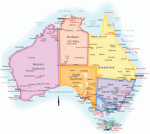 Sydney, the largest Australian city and state capital of New South Wales, has a population of about 4.3 million. Known for landmarks such as the Sydney Opera House and the Sydney Harbour Bridge, the multicultural city attracts tourists from all over the world. Sydney also boasts a well-established educational system, including public, denominational and independent schools as well as several universities. An Australian degree is recognized and well-regarded around the world.
Sydney, the largest Australian city and state capital of New South Wales, has a population of about 4.3 million. Known for landmarks such as the Sydney Opera House and the Sydney Harbour Bridge, the multicultural city attracts tourists from all over the world. Sydney also boasts a well-established educational system, including public, denominational and independent schools as well as several universities. An Australian degree is recognized and well-regarded around the world.
.
Student Report Basics
- Type of School: Local, Catholic school
- Academic Year: 2002 (Did you know? Australian schools run January to December)
- Grade: 2
Here’s the report card! The blue numbers highlight a few interesting aspects of the report and the numbers correspond to notes below the image.
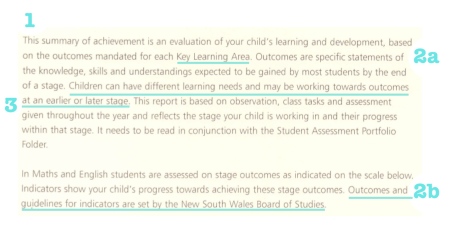
1. Descriptions, Definitions and Instructions
Unlike any other report card we have seen so far, this evaluation is 11 pages long (for instance, the report cards from Dalhousie and Kathmandu are two pages and consist primarily of numbers, rather than words). While many other educational systems attempt to summarize a year’s worth of work into a page or two, this report card include descriptions of the child’s performance, definitions of expected “outcomes” and provides the parents with instructions for interpreting the report card. (Note that this is the first Elementary School report card we have analyzed). Parents, grab a cup of coffee and find a comfy seat, this might take a while!
2. Key Learning Areas determined by the New South Wales Board of Studies
Australians base the educational system and curriculum on Key Learning Areas, which consist of English; mathematics; science and technology; the arts; health and physical education; and study of human society and its environment, which includes languages other than English. The Key Learning Areas and “outcomes and guidelines for indicators” demonstrate the government’s involvement in upholding a certain standard of education.
3. Children are Different
“Children can have different learning needs and may be working towards outcomes at an earlier or later stage.” Translation ~ parents, don’t worry if you’re child is ahead in some areas and behind in others!
.
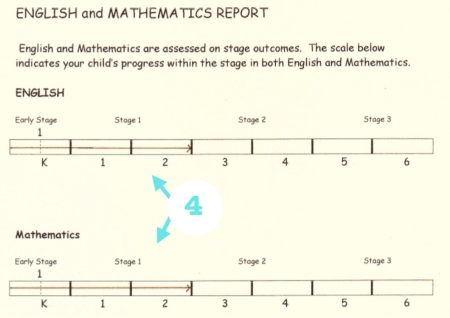
4. Progress on a Scale!
These scales show this student’s progress for the areas of English and Mathematics. This student has reached the targeted outcomes for Grade 2 (which is the second year of Stage 1), and is ready to begin Grade 3. This visual representation of progress is a relatively unique aspect to report cards!
.
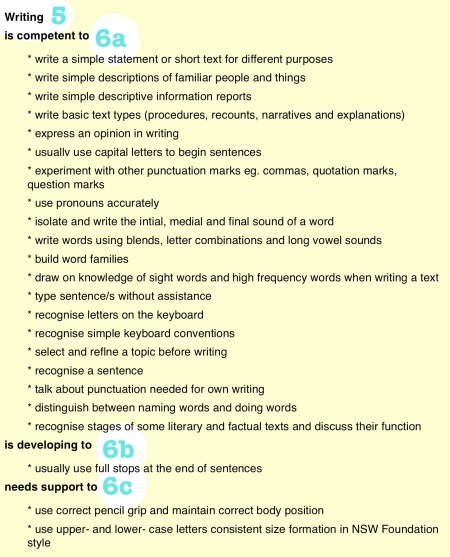
5. English and Mathematics… whole numbers, volume, time, chance…
About 5 pages are dedicated to English and Mathematics and each area is broken down to the subsections listed below.
English
- reading
- writing
- talking and listening
Mathematics
- working mathematically,whole numbers, fractions and decimals
- addition and subtraction, multiplication and division
- chance, data
- patterns and algebra
- length, area, volume capacity, mass
- position, three dimensional space, time, two-dimensional space
6. Your child is Competent… Developing… Needs Support…
Each area listed above includes a list of “indicators.” The teacher then marks the child’s achievement for each indicator as competent, developing or needs support. Note that these categories are stated in the positive form of the meaning (rather than, “is behind the rest of the class”). For instance, in writing, this child:
- Is competent to: write a simple statement or short text for different purposes,
- Is developing to: usually use full stops at the end of sentences,
- Needs support to: use correct pencil grip and maintain correct body position.
Consider how this differs from JUST a letter or number grade for mathematics in general; in comparison to all the information provided, the letter or number illustrates only the child’s standing in relation to the other students in the class. This process explains the child’s progress in relation to each task.
.
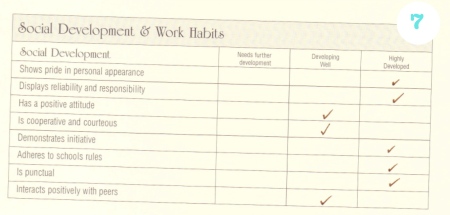
7. Social Development… at a 2nd grade level
Besides English and mathematics, students receive an assessment for Religious Education, Science and Technology, Human Society and Its Environment, Creative Arts (Music, Visual Arts, Drama) and Health and Physical Education. Teachers also assess Social Development and Work Habits. Looks like this student is “developing well” in some areas and is “highly developed” in others. Well done!
.
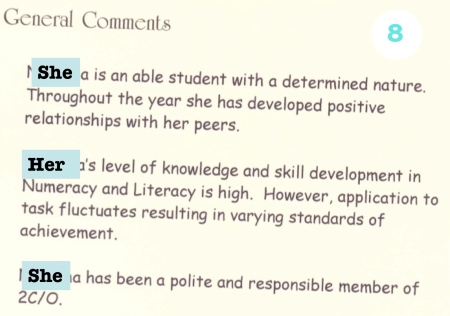
8. General Comments
This section allows the teacher to comment on the child’s social and academic development, noting areas that may need attention.
.
See Report Card from Dalhousie, India; Kathmandu, Nepal; Soro, Denmark
Report card analysis to look forward to: Palestine, Malawi, Australia, Canada, Mexico and more!

[…] are the percentage grades? Where is the B + and A –? Much like the second grade report card we looked at, this school specifies specific outcomes, for instance, “Identifies, […]
[…] school has a relatively short report card (1 page, as opposed to the 11 page report card from Australia). Using space allocation as a measure of importance, teacher’s comments constitute the main […]
PLR article…
[…]Report Cards from Around the World: Sydney, Australia « Finding Schools[…]…
Thanks for the marvelous posting! I quite enjoyed reading it,
you could be a great author.I will make certain to bookmark your blog and definitely will come back at some point.
I want to encourage one to continue your great work,
have a nice morning!
No matter if some one searches for his essential thing, so he/she wants to be available
that in detail, thus that thing is maintained over here.
If you want to grow your experience just keep visiting this web page and be updated with the
newest gossip posted here.
Greetings! Very useful advice in this particular post!
It is the little changes which will make the most significant changes.
Thanks for sharing!